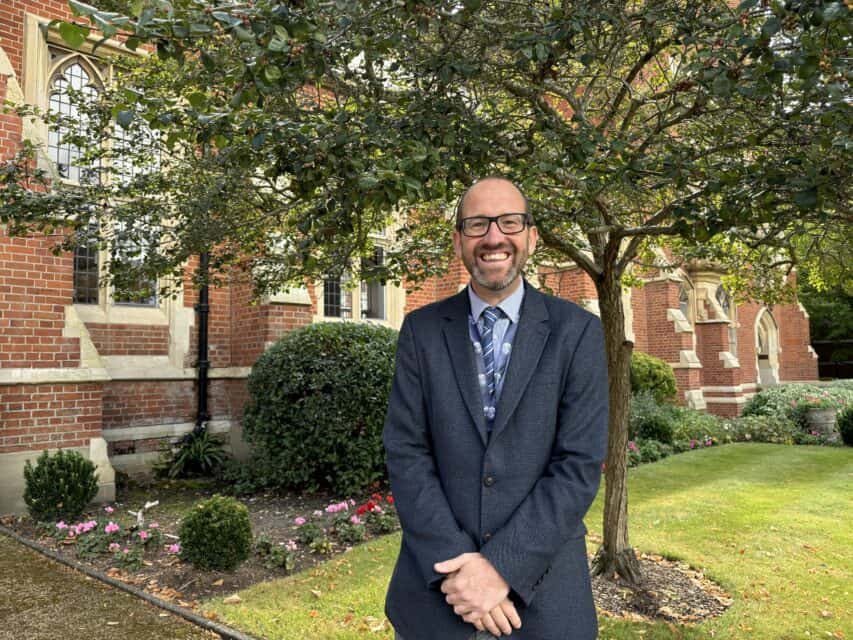Former Managing Director of Cambridge Education Group’s CATS College, Glenn Hawkins is now at the helm of a group of private equity backed sixth form colleges in the UK. Previously a school principal he talks with Сư�洫ý about how educational ethos can merge with commercial objectives, what he learned from CEG and where he’s planning to take Astrum.
Сư�洫ý: Astrum Education is one of the newest players to the UK’s independent secondary sector. Tell me about how it began.
GH: I’ve been here for eighteen months and about nine months before that the schools were bought. They were loosely held together for that first year so our current board chairman stepped in as an interim chief executive. We hadn’t named it as Astrum at that point or made any major announcements to the world but they were under new ownership. It really came together with the strategic vision and all the product changes from one year ago.
Сư�洫ý: And how have you done in the first intake?
All three of our colleges now have full boarding school status – this makes us the only organisation with three central London boarding schools
GH: We have made a significant early impact by engaging the premium international markets. We’ve gone from no real international strategy to having 12 full time sales people– some who are based full time overseas, some who are travelling from the UK or with significant experience in international recruitment.
We’ve opened a second campus with Chelsea Independent College, and we’ve opened two student accommodation blocks. All three of our colleges now have full boarding school status – this makes us the only organisation with three central London boarding schools.
Сư�洫ý: What’s the relationship between Astrum and private equity fund Sovereign Capital?
GH: Sovereign Capital are our investment partner. They’re a private equity company with significant experience in education which forms a very important part of their portfolio and is where they’ve won their awards and made some of their best returns.
I first worked with Sovereign Capital more than ten years ago at the Alpha Plus Group as sales and marketing director. After then working at Cambridge Education Group, I returned to Sovereign Capital. For Astrum they have provided the finance to acquire the three schools or colleges that we’ve started with and assembled the core of the management team–myself, the finance director and the chairman. They helped us define the strategy of what this group hopes to achieve over the next five years along with how it’ll be financed and supported.
They have very active representation on the board because they have so much experience in education. They understand the relationship between commercial success and quality of delivery. Sovereign’s approach resonates with that at Astrum – we compete on quality not price.
“There is no conflict at all between commercial and education objectives – they support each other”
Сư�洫ý: We are seeing more activity from private investors in the sector. In your view, where do educational and commercial objectives merge?
GH: Because of my background I have no other choice than to merge these two. I very much enjoy the challenge of commercialisation of education, but I simply can’t allow myself to make any academic compromises along that route at all because I am an educator at heart. So any business I’m ever involved with will take that approach- high value provision that delivers at the cutting edge of what’s possible in education.
Generating profit supports investment that drives up quality resulting in customer expectations being exceeded, leading to more students, greater profits, further investments and on it goes.
As long as your backers are sympathetic to the requirement to invest in quality and customer satisfaction and your mangers can deliver then this virtuous circle is achievable within education. There is no conflict at all – they support each other.
Сư�洫ý: There’s a pattern with private equity of buying, building up and selling. Is that going to happen with Astrum as well?
GH: It would be no surprise if within five years Sovereign exited. That of course doesn’t mean that I leave and the management team here would inevitably stay in place. Our customers wouldn’t see any change if it happens.
Сư�洫ý: The growth of CEG and CATS is the darling story of the industry. You were elemental to that success, what was your strategy?
“Opening CATS Academy Boston was my swansong. At a point in time where Astrum became a possibility”
GH: It was a good business from the outset but really needed an injection of investment and some new ideas. The growth was through internationalisation. The mother ship college in Cambridge was largely British at a time when the British market was starting to flatten in general so we recognised that we needed to seriously back an international campaign.
We assembled a good sales team– a number of whom are at Astrum now– and we hit the markets hard in quite an industrial fashion. We engaged a lot of agents quickly. We invested in the facilities, premises, and student accommodation. We opened CATS College London when UKBA were changing all the rules and the points based system was coming in so it was a very turbulent time but we successfully launched and it was the first new college of that type for quite some time.
We realised then that we could get around the significant barriers to opening new colleges so pretty quickly we looked at Boston to open CATS academy.
Сư�洫ý: Was it easier opening in Boston the London?
GH: It was easy in terms of the appetite within the market for east coast education particularly in Boston. It was just the regulatory framework we had to work in. It’s all very similar to the UK in many respects but different enough to disarm you. But we stayed with it, and got there and that was my swansong. At a point in time where Astrum became a possibility.
Сư�洫ý: What have you taken from the CEG experience that you’re implementing at Astrum?
GH: What I learned from Cambridge Education Group is you can move fast in this industry. It’s thought to be burdened with inertia, but it doesn’t have to be that way. If you’ve got absolutely clear strategy, good people and supportive financial partners you can make a difference very quickly.
Сư�洫ý: Are you more nimble because of the level of education you’re providing?
GH: Dealing with sixth form you do have more lightness on your feet than going down into prep schools but still I think it is possible to achieve a lot in a few years and our aim is to move down the age ranges.
We’re working hard to make acquisitions outside of London because we feel that there’s a real growth in demand for pre-16 education in the UK for a number of key international markets. Some parents would like not to have their children of 11 years of age in London so we’re going to satisfy that need.
Сư�洫ý: It’s interesting that you’re moving down rather than up.
GH: We’ve certainly given consideration to pathway programmes and the huge success people like INTO have had with that. It’s a very crowded market, and there’s been a real land grab. We feel that our strength in pastoral care gives us a real and distinct advantage.
“We run a continuous feedback loop of teaching and learning that supports all that is good in British education with influences from the American style of coaching and training”
Сư�洫ý: How does your recent partnership with NCUK fit into that strategy?
GH: NCUK have been working with international students since 1987 and we are now providing foundation courses in partnership with their 11 founder universities to help students achieve their place on a UK degree programmes. Our colleges will be delivering these courses for the first time this year, the uptake has been excellent and all indications are that these will become a very popular option in future years.
Сư�洫ý: How does Astrum stand apart from other secondary or sixth form schools?
GH: Two key aspects. One is how we make sure delivery in the classroom is exceptional. We plot a route of clear milestones of achievement from day one to A level success. So for every student we conduct a weekly analysis of attainment against expectations. They are formally assessed every week and their learning plan adapted accordingly. This will include supplementary one to one tuition and specific study skills coaching.
We run a continuous feedback loop of teaching and learning that supports all that is good in British education with influences from the American style of coaching and training.
And our second focus is around customer service to the extended stakeholder group which includes how we treat our international agent partners, along with the students’ parents, aunties, uncles and extended family.
We employ people who are in sympathy with our customer service culture. We have worked hard to understand and define the needs of this group – whether it is a student in South Kensington or a worried grandmother in Singapore.



